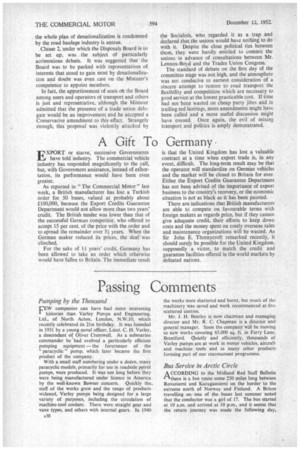A Gift To Germany
Page 32

If you've noticed an error in this article please click here to report it so we can fix it.
EXPORT or starve, successive Governments have told industry. The commercial vehicle industry has responded magnificently to the call, but, with Government assistance, instead of exhortation, its performance would have been even greater.
As reported in "The Commercial Motor" last week. a British manufacturer has lost a Turkish order for 50 buses, valued at probably about £100,000, because the Export Credits Guarantee Department would not allow more than two years' credit. The British tender was lower than that of the successful German competitor, who offered to accept 15 per cent. of the price with the order and to spread the remainder over 31 years. When the German maker reduced its prices, the dealwas clinched.
For the sake of li years' credit, Germany has been allowed to take an order which otherwise would have fallen to Britain. The immediate result is that the United Kingdom has lost a valuable contract at a time when export trade is, in any event, difficult. The long-term result may be that the operator will standardize on German vehicles and the market will be closed to Britain for ever. Either the Export Credits Guarantee Department has not been advised of the importance of export business to the country's recovery, or the economic situation is not as black as it has been painted.
There are indications that British manufacturers are able to compete on favourable terms with foreign makers as regards price, but if they cannot give adequate credit, their efforts to keep down costs and the money spent on costly overseas sales and maintenance organizations will be wasted. As Sir John E. Thornycroft remarked recently, it should surely be possible for the United Kingdom, supposedly a victor, to match the credit and guarantee facilities offered in the world markets by defeated nations.




























































































